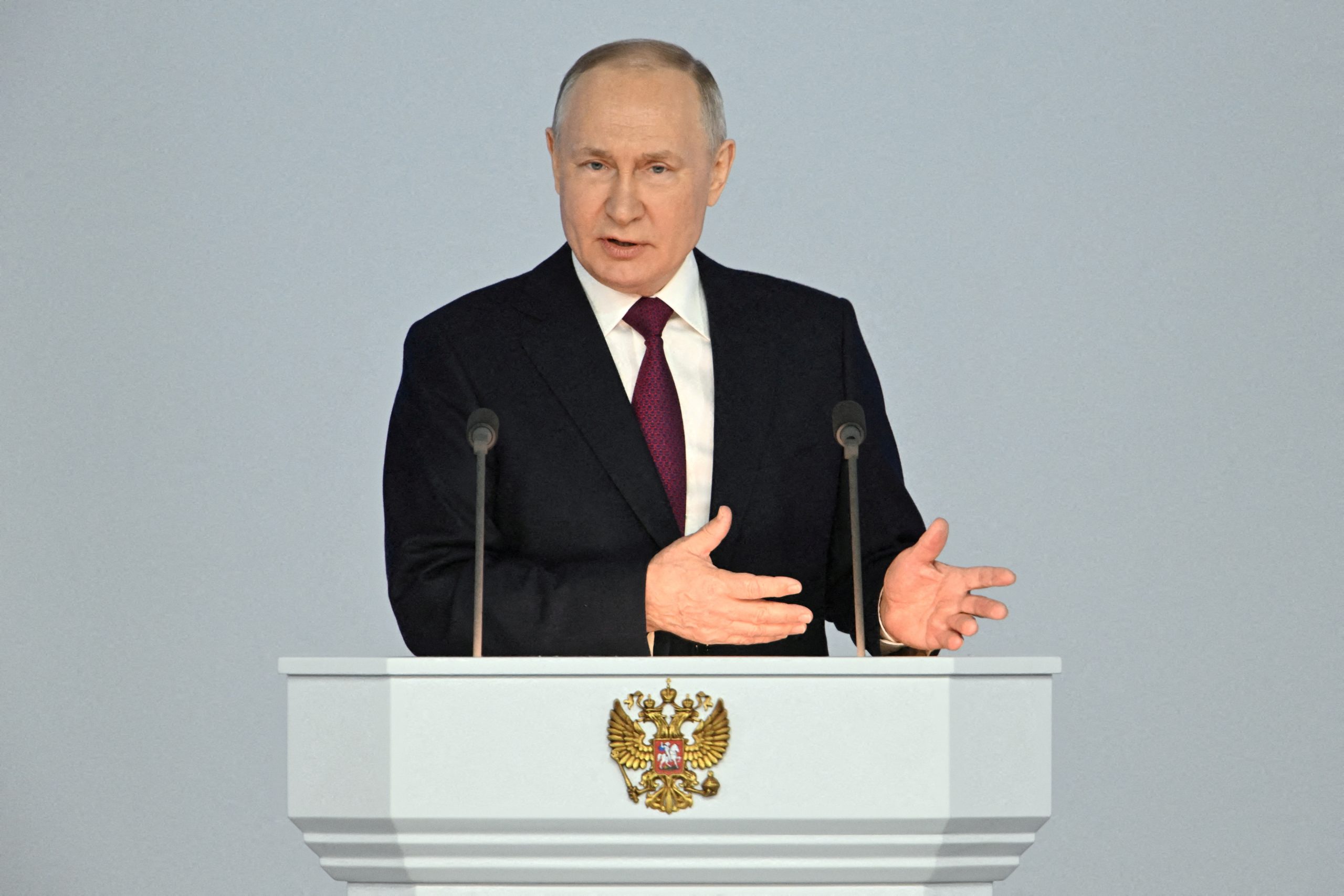
Chris Lange, FISM News
[elfsight_social_share_buttons id=”1″]
Russian President Vladimir Putin on Tuesday signed a bill officially suspending the last remaining nuclear arms treaty with the U.S. amid soaring tensions with Washington over the conflict in Ukraine. The measure was quickly ratified by both houses of the Russian parliament and went into effect immediately.
Putin announced last week that he would suspend the 2010 New START treaty, citing the U.S. and NATO’s objective in seeing Russia defeated in Ukraine.
Russia’s Foreign Ministry said the country would continue to respect the caps on nuclear weapons outlined in the treaty and provide the U.S. with notifications about test launches of ballistic missiles, per The Associated Press. However, the suspension of the treaty prohibits any nuclear site inspections, essentially forcing Washington to rely on Moscow’s word.
A top U.S. arms control official condemned Russia’s suspension of the pact on Monday but said that Washington will try to work with Moscow to continue its implementation.
“Russia is once again showing the world that it is not a responsible nuclear power,” Bonnie Jenkins, the U.S. undersecretary of state for arms control, said at a session of the Conference on Disarmament, a United Nations-affiliated international forum.
“We’re not seeing any evidence that Russia is in noncompliance,” Jenkins told reporters on the sidelines of the forum, adding: “We remain ready to work assertively with Russia to fully implement the New START treaty.”
The Obama-era pact entered into with then-Russian President Dmitry Medvedev capped both country’s deployed nuclear warheads at 1,550 and deployed missiles and bombers at 700. On-site inspections to verify compliance were suspended in 2020 amid the COVID-19 pandemic. Last November, Russia abruptly canceled scheduled talks with the U.S. to resume inspections.
DRONE STRIKES DEEP INSIDE RUSSIA
Putin on Wednesday ordered his forces to step-up protection at the border in the wake of multiple reports of drone strikes deep inside Russian territory in the south and west.
Kremlin officials said that the drones were launched from Ukraine late Monday and into Tuesday, with one striking within 60 miles of Moscow in the village of Gubastovo. Pictures of the drone circulating on social media revealed that it was Ukrainian-made and had a range capacity of up to 500 miles but lacked the payload capacity to carry large amounts of explosives.
Missile attack warnings that appeared on Russian television were subsequently blamed by the Kremlin on an unspecified cyberattack.
Also on Tuesday, authorities reported that airspace around St. Petersburg, Russia’s second-largest city, was temporarily closed, halting all departures and arrivals at the main airport, Pulkovo. No explanation was given for the move. However, some Russian reports said it was triggered by a drone.
In keeping with past practices, Ukrainian officials did not claim responsibility for the attacks.
Some Russian military bloggers suggested that the drone raids may have been a rehearsal for a more ambitious attack.
BLINKEN ANNOUNCES $25 MIL TO CENTRAL ASIA’S FORMER SOVIET REPUBLICS
U.S. Secretary of State Antony Blinken told the leaders of former Soviet republics in Central Asia on Tuesday that the U.S. would not abandon them in the face of soaring food and fuel prices resulting from U.S.-imposed sanctions on Russia.
“We are watching compliance with sanctions very closely and we’re having an ongoing discussion with a number of countries, including our C5 partners, on the economic spillover effects,” Blinken said at a news conference after a meeting with officials of the five Central Asian states in the Kazakh capital Astana, per Reuters.
Blinken announced $25 million in new funding, on top of the $25 million that Biden has already committed to the region, to support economic growth and help businesses find new export markets. The funds are also meant for use in establishing new trade routes amid Washington’s suspicions that Russia plans to use current routes to bypass sanctions and import goods.
LAWMAKERS GRILL PENTAGON IG ON FRAUD INVESTIGATION
Pentagon Inspector General Robert Storch told lawmakers on the House Armed Services Committee Tuesday that his office has found no evidence yet that any of the billions of dollars in U.S.-supplied weapons and aid to Ukraine has been misused, with the added caveat that inspections are still in their early stages.
Storch acknowledged under intense questioning that a number of allegations of misuse of funds have come into a new hotline but stressed that there have been “limited findings” thus far, with multiple reports pending. Storch repeatedly refused to talk about ongoing investigations into fraud.
Some Republican lawmakers have repeatedly raised concerns about the billions the Biden administration has poured into Ukraine since Russia’s invasion last year, citing the country’s longstanding problems with corruption and the administration’s inability to account for how the money is being spent.
Committee chair Rep. Mike Rogers (R-Ala.) pointed out that Congress has appropriated more than $100 billion in military, economic, and humanitarian assistance to Ukraine and NATO allies. From that figure, the U.S. has released more than $75 billion so far, including nearly $32 billion in weapons and training to Ukraine.
“These are unprecedented numbers. And it requires an unprecedented level of oversight by Congress,” Rogers said.
Pentagon press secretary Brig. Gen. Pat Ryder asserted at a press briefing Tuesday that the Pentagon has a “robust program” to track and monitor U.S. aid to Ukraine. He also reiterated that the U.S. recently sent in a small team of inspectors to Ukraine to provide virtual inspections and, when possible, onsite inspections to ensure appropriate use.
